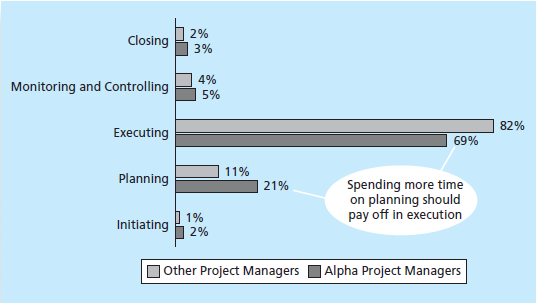Have you ever wondered how much of your day should be devoted to managing a project? Finding the right balance can be tricky, but it’s crucial for your success.
You might feel like you’re constantly juggling tasks, meetings, and deadlines. You’re not alone. Many project managers struggle with this exact dilemma. But what if you could streamline your efforts and become more efficient? Imagine having more time to focus on strategic decisions, rather than getting bogged down in every detail.
This article will guide you on how to allocate your time wisely, ensuring both productivity and peace of mind. Dive in, and let’s explore how you can maximize your impact without burning out.
Time Allocation For Key Responsibilities
Time allocation for key responsibilities is crucial in project management. Balancing various tasks can determine the success or failure of a project. How much time should you, as a project manager, dedicate to each aspect of your role?
Planning And Scheduling
Planning and scheduling are the foundation of any project. A project manager should spend around 20-30% of their time on this. Consider breaking down tasks into manageable steps. This ensures that you can effectively track progress and make adjustments as needed.
During a project I managed last year, sticking to a detailed schedule helped us meet deadlines without unnecessary stress. Are you dedicating enough time to this critical phase?
Team Management
Effective team management requires a consistent commitment. Allocate 25% of your time to guiding and supporting your team. This involves regular check-ins and ensuring everyone is aligned with the project goals.
I found that being available for my team not only improved morale but also productivity. How often do you actively engage with your team?
Risk Management
Risk management is about anticipating challenges before they derail your project. Spend about 15% of your time assessing potential risks and devising mitigation strategies. Regularly update your risk assessment as the project progresses.
In one project, identifying a potential delay early on allowed us to devise a contingency plan that saved both time and resources. Are you proactively identifying risks in your projects?
Stakeholder Communication
Stakeholder communication is vital for transparency and trust. Allocate 10-20% of your time to keeping stakeholders informed. This includes regular updates and addressing any concerns they may have.
During a previous project, open communication with stakeholders helped us gain their trust and support. How effectively are you communicating with your stakeholders?
Balancing these responsibilities requires a strategic approach. Adjust your time allocation based on your project’s specific needs and challenges. Are you ready to optimize your time for better project outcomes?
Balancing Administrative And Strategic Tasks
Balancing time between administrative duties and strategic planning is crucial for project managers. Effective time management ensures project success and team productivity. Allocating specific hours to both tasks helps maintain focus and progress. This approach supports clear communication and efficient workflow.
Balancing administrative and strategic tasks is a crucial skill for any project manager. It’s not just about ticking off boxes on a checklist but ensuring that every minute spent contributes to the project’s success. Striking the right balance can often feel like juggling, but with the right approach, you can make the most of your time and effort.
Prioritizing Daily Tasks
As a project manager, your day is filled with tasks screaming for attention. How do you decide which to tackle first? Start by identifying tasks that directly impact your project’s progress.
Use a simple method like the Eisenhower Box to sort your tasks by urgency and importance. This helps you focus on what’s essential right now, rather than getting lost in endless emails and reports. Think about what will move the needle today, and act on that.
Remember the time you spent an entire day on admin tasks and felt like nothing moved forward? It happens to the best of us. Prioritizing not only improves productivity but also reduces stress.
Long-term Project Goals
While daily tasks keep the wheels turning, don’t lose sight of the bigger picture. How often do you check if your efforts align with the project’s long-term goals? This is where strategic thinking comes into play.
Set aside regular time to review your project’s objectives. Are your current actions leading you towards those goals? If not, it’s time to recalibrate.
Picture this: You focus solely on immediate tasks for weeks, only to realize you’ve drifted off course. Regularly revisiting long-term goals ensures you’re steering the project in the right direction.
Balancing these daily priorities with strategic vision is like walking a tightrope. But with careful attention, you’ll find that sweet spot where administration meets strategy. What steps will you take today to achieve that balance?
Effective Time Management Techniques
Effective time management techniques are essential for project managers striving to keep projects on track. Understanding how to allocate your time wisely can directly impact the success of your project. In this section, we’ll explore practical strategies that can help you manage your time efficiently and effectively.
Setting Clear Objectives
Imagine starting a journey without a destination—confusing, right? The same goes for project management. Setting clear objectives is crucial for guiding your time management efforts. Begin by identifying what success looks like for your project. Break down larger goals into smaller, actionable tasks. This clarity enables you to prioritize your time based on what needs immediate attention versus what can wait.
Utilizing Project Management Tools
Tools can be your best friends in managing your time effectively. From Trello to Asana, these platforms offer features that help you track progress, set deadlines, and collaborate seamlessly. They act as a digital assistant, reminding you of upcoming tasks and deadlines. Choose tools that align with your project needs and integrate them into your daily routine. These tools can help you stay organized and focused, saving you precious hours.
Delegation Strategies
Trying to do everything yourself is a recipe for burnout. Delegation is key to effective time management. Consider your team’s strengths and assign tasks accordingly. Trust your team members and empower them to take ownership of their responsibilities. By sharing the workload, you free up your time to focus on critical aspects of the project. Are you using delegation to its fullest potential?
Effective time management techniques are not just about ticking off tasks. They are about making informed decisions that propel your project forward. As you implement these strategies, keep evaluating their impact on your project. Are you managing your time effectively? Your answers will guide your path to success.

Credit: projectmanagementacademy.net
Avoiding Common Time Traps
Avoiding common time traps is crucial for any project manager. These traps can consume hours, leaving little time for essential tasks. Project managers often find themselves overwhelmed, struggling to allocate time effectively. Understanding and sidestepping these pitfalls can enhance productivity and ensure a project’s success.
Meeting Overload
Meetings can become a significant time sink. Many project managers attend too many meetings. Each meeting eats into valuable time. It’s important to evaluate the necessity of each meeting. Could an email suffice? Could a quick call be more efficient? Limiting meetings to only what’s essential helps reclaim hours.
Consider setting strict agendas for necessary meetings. This keeps discussions focused. Encourage concise communication. Invite only those who truly need to be there. Streamlining meetings can significantly reduce time wastage.
Micromanagement Pitfalls
Micromanaging is another common time trap. It can drain both time and energy. Project managers need to trust their team. Delegating tasks appropriately is key. This empowers team members and frees up the manager’s schedule.
Resist the urge to oversee every small task. Instead, focus on the bigger picture. Set clear goals and expectations. Let your team handle the details. This not only saves time but also boosts team morale and productivity.
Expert Advice On Time Optimization
Expert advice on time optimization can help project managers work efficiently. Proper time allocation ensures project goals are met without stress. Striking a balance in time management is crucial for success. Learning from experts can guide managers in optimizing their schedules effectively.
Insights From Industry Leaders
Industry leaders suggest breaking tasks into smaller parts. This approach helps in managing time better and reduces overwhelm. Leaders recommend setting clear priorities to focus on important tasks first. Regular reviews of progress ensure that time is being used wisely.
Listening to experienced voices can shed light on effective strategies. Many advise using time management tools to track hours spent. These tools can provide valuable insights into how time is distributed. Adjustments can then be made to enhance productivity.
Real-world Case Studies
Real-world case studies illustrate successful time management in projects. A software company improved efficiency with daily stand-up meetings. This brief meeting structure allowed team members to align goals quickly. It reduced time spent in lengthy discussions, boosting productivity.
Another case study involves a construction firm. They used time-tracking software to monitor project progress. This method helped in identifying time-consuming tasks early. The team could then adjust schedules to meet deadlines effectively.
Examining these cases provides valuable lessons for project managers. They highlight practical methods for optimizing time in diverse sectors. Implementing similar strategies can lead to better project outcomes.

Credit: www.researchgate.net
Frequently Asked Questions
How Many Hours Should A Project Manager Spend On A Project?
A project manager’s hours vary by project size and complexity. Typically, they spend 10-20% of the project’s total hours. Efficient time management and delegation are crucial. Regularly assess workload to ensure effective project oversight and balance.
What Is The 80 20 Rule For Project Managers?
The 80/20 rule, or Pareto Principle, suggests that 80% of project results come from 20% of efforts. Project managers should focus on identifying and prioritizing the tasks that yield the highest impact to optimize productivity and efficiency. This approach helps in managing time and resources effectively.
What Is The 15-15 Rule In Project Management?
The 15-15 rule in project management states that if a project exceeds 15% over budget or 15% behind schedule, it is likely to fail. This guideline helps managers identify when a project requires corrective action to avoid failure.
Is 90% Of A Project Manager’s Time Spent Communicating?
Yes, project managers often spend around 90% of their time communicating. Effective communication is essential for managing tasks, resources, and team collaboration. They interact with stakeholders, team members, and clients to ensure project success. Clear communication helps resolve issues and keeps projects on track.
Conclusion
Balancing time on a project is key for project managers. Understanding project needs helps allocate time wisely. Focus on tasks that drive progress. Avoid getting lost in minor details. Regular check-ins ensure you’re on track. Communication with your team is crucial.
It keeps everyone aligned and informed. Time management tools can boost efficiency. They help prioritize tasks effectively. Remember, flexibility is important. Projects can change unexpectedly. Adapting to new challenges is part of the job. Ultimately, a project manager’s time should reflect project goals.
Prioritize wisely, communicate clearly, and adjust as needed. Success follows good time management.

